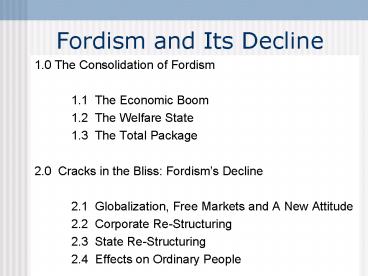Fordism and Its Decline - PowerPoint PPT Presentation
1 / 18
Title:
Fordism and Its Decline
Description:
Education. 1.0 The Consolidation of Fordism. 1.2 The Welfare State. State Income Policies ... OECD Report (1978) 'New Protectionism' STRUCTURAL RIGIDITIES ... – PowerPoint PPT presentation
Number of Views:744
Avg rating:3.0/5.0
Title: Fordism and Its Decline
1
Fordism and Its Decline
- 1.0 The Consolidation of Fordism
- 1.1 The Economic Boom
- 1.2 The Welfare State
- 1.3 The Total Package
- 2.0 Cracks in the Bliss Fordisms Decline
- 2.1 Globalization, Free Markets and A New
Attitude - 2.2 Corporate Re-Structuring
- 2.3 State Re-Structuring
- 2.4 Effects on Ordinary People
2
1.1 The Economic Boom (1945-c.1975)
1.0 The Consolidation of Fordism
- a period of unprecedented economic growth
- a commitment to Keynesian economics
- the state becomes involved in the economy
- the civil service doubles in size in the three
decades following WWII - rise of consumer society
3
1.2 The Welfare State
1.0 The Consolidation of Fordism
- Definition --
- an amalgam of state policies which attempt to
patch-up or gloss-over basic social needs which
are not met by the simple functioning of the
capitalist mode of production
4
1.2 The Welfare State
1.0 The Consolidation of Fordism
- Making the Welfare State in Canada
- pre-WWII not much of a welfare state in
Canada - but, Depression of 1930s exposes risks of
leaving things this way - in postwar world, the state decides it must
intervene, and it does this in a variety of ways
..
5
1.2 The Welfare State
1.0 The Consolidation of Fordism
- Social Programmes
- Unemployment Insurance (1941)
- Family Allowances (1945)
- Old-Age Pensions (1927, expanded 1951)
- Social Assistance
- Canada Pension Plan (1965)
- Housing
- Medical Insurance (1968)
- Education
6
1.2 The Welfare State
1.0 The Consolidation of Fordism
- State Income Policies
- Government attempts to smooth out business cycles
using monetary and fiscal policy - Policy of full employment
- New tax policies help redistribute income
7
1.2 The Welfare State
1.0 The Consolidation of Fordism
- Collective Bargaining
- PC 1003 (1944) legal recognition of unions
wartime measure - Industrial Disputes and Investigations Act
(1948) permanent
8
1.3 The Total Package
1.0 The Consolidation of Fordism
- Sustained economic growth
- Wage growth and increasing family incomes
- Expansion of welfare state
- Mass Production/Mass Consumption economy
9
2.1 Globalization, Free Markets, New Attitudes
2.0 Cracks in the Bliss Undoing Fordism
- 1945-75 global gradualism
- Ideologies Adam Smith, Frederich von Hayek,
Milton Friedman and free market thinkers - Deceleration of economic growth by 1970s
economic crisis, OPEC, Vietnam War - ability to pay for Fordist compromise becomes a
problem
10
2.1 Globalization, Free Markets, New Attitudes
2.0 Cracks in the Bliss Undoing Fordism
- Neoliberalism
- OECD Report (1978) New Protectionism
- STRUCTURAL RIGIDITIES
11
2.1 Globalization, Free Markets, New Attitudes
2.0 Cracks in the Bliss Undoing Fordism
- Neoliberalism
- OECD Report (1978) New Protectionism
- STRUCTURAL RIGIDITIES
- -- need to attack
- 1. "attitudes and institutional developments
which evolved during a period of uninterrupted
high levels of employment"
12
2.1 Globalization, Free Markets, New Attitudes
2.0 Cracks in the Bliss Undoing Fordism
- Neoliberalism
- OECD Report (1978) New Protectionism
- STRUCTURAL RIGIDITIES
- -- need to attack
- 2. the rapid growth of the public sector and of
social programmes and regulations which, however,
desirable in themselves, sometimes had
unintended adverse side effects on incentives to
work, save and invest.
13
2.1 Globalization, Free Markets, New Attitudes
2.0 Cracks in the Bliss Undoing Fordism
- Neoliberalism
- OECD Report (1978) New Protectionism
- STRUCTURAL RIGIDITIES
- -- need to attack
- 3. attempts by governments to alleviate the
social consequences of structural change by
preserving given production and employment
structures - Remember Creative Destruction
14
2.1 Globalization, Free Markets, New Attitudes
2.0 Cracks in the Bliss Undoing Fordism
- Neoliberalism
- OECD Report (1978) New Protectionism
- STRUCTURAL RIGIDITIES
- 4. most importantly, slow growth itself makes
structural adjustment more difficult
15
2.2 Corporate Re-Structuring
2.0 Cracks in the Bliss Undoing Fordism
- To compete internationally companies
- create a more flexible workforce
- restructure labour processes
- reduce workforce size, drive remaining workers
harder - outsource and/or relocate to lower wage
environments - get lean
- Royal Commission on Canadian Economy McDonald
Report (1985)
16
2.3 The State
2.0 Cracks in the Bliss Undoing Fordism
- For Canada to better compete globally,
governments try to harmonize social policy with
other free trade jurisdictions. In this race to
the bottom they - get tough with public sector unions
- curb wages increases for their employees
- turn back on full employment embrace
monetarism - gut social programmes
- generally attempt to cut social costs
17
2.4 Effects on Ordinary Canadians
2.0 Cracks in the Bliss Undoing Fordism
- Erosion of Fordist security
- little evidence that promises of neoliberalism
have trickled down - Increase/Decrease in Real Deposable Income/yr
- 1960s 3.9
- 1970s 3.0
- 1980s 1.1
- 1990s -3.3
- after tax
- Source A. Jackson et al. Falling Behind.
Canadian Centre for Policy Alternatives, (2000)
18
MAKE THE PIE HIGHER by George W. Bush
- I think we all agree, the past is over. This is
still a dangerous world. It's a world of madmen
and uncertainty and potential mental losses.
Rarely is the question asked Is our children
learning? Will the highways of the Internet
become more few? How many hands have I shaked?
They misunderestimate me. I am a pitbull on
the pantleg of opportunity. I know that the
human being and the fish can coexist. Families
is where our nation finds hope, where our wings
take dream. Put food on your family! Knock
down the tollbooth! Vulcanize society! Make the
pie higher! Make the pie higher!































